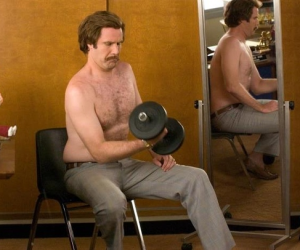 Because I have a body type somewhere between Steve Urkel and Sheldon Cooper, some have wondered out loud why I don’t go to the gym – which is apparently a thing nearly everyone does these days. But really, if I wanted to do something both penitential and beneficial, why wouldn’t I just read Pope Francis’ Evangelii Gaudium? No, not because it is a 50,000 word marathon, nor because the generous use of exclamation marks makes for a physically exhausting read, but because the Holy Father says things like this:
Because I have a body type somewhere between Steve Urkel and Sheldon Cooper, some have wondered out loud why I don’t go to the gym – which is apparently a thing nearly everyone does these days. But really, if I wanted to do something both penitential and beneficial, why wouldn’t I just read Pope Francis’ Evangelii Gaudium? No, not because it is a 50,000 word marathon, nor because the generous use of exclamation marks makes for a physically exhausting read, but because the Holy Father says things like this:
Or this:
Or even this:

Pope Francis certainly doesn’t hold back here, and as one who all too easily falls in to an overwhelming fixation on right worship, the very Paul Keating-esque charge of “self-absorbed promethean neopelagianism” cuts right to my core. It’s no use yelling out “BUT POPE, LOOK AT ALL THE CAFETERIA CATHOLICS! HOW TERRIBLE ARE THEY?!” because it’s exactly that behaviour which the pope is smacking down. They’re grating words, but they’re necessary, because a the danger of spiritual pride is an old trick of the devil – and one that constantly haunts me.
 We are the young, our lives are a mystery…
We are the young, our lives are a mystery…
In defence of a sometimes inordinate concern for liturgy, when one feels like most Catholics have unilaterally decided that Church teaching can be privatised and customised according to one’s feelings, the Mass becomes the final battle-line where relativistic ideologues seek to impose the “primacy of conscience” on public worship. It’s one thing to dissent from Church teaching in the more private aspects of Christian life, it’s quite another to force everyone to approve of dissent through heterodox liturgy.
Indeed, there’s nothing wrong with defending and advocating for a proper observance of the Mass. When you have experienced beautiful liturgy and studied the depth of its meaning, it’s hard not to feel a sense of Macabeean anger at the pastor-centric DIY theatre of self affirmation that the Mass can be reduced to. But if we are driven to distraction throughout the whole Mass (and in our conversations for the following three hours) because the priest insists on ad libbing the preface – then it is us that must examine our consciences. The two greatest commandments are not “say the black and do the red”; they are to love The Lord with all your heart, mind, soul and strength, and your neighbour as yourself. If that becomes unclear in the way we think, speak and act, there is something very, very wrong.
 Ideological Adolescence
Ideological Adolescence
This is what I love about Pope Francis and Evangelii Guadiuum – the Holy Father is not afraid to point out that there’s a gutter on both sides of the road. It’s no use to assume that this is a traditionalist-bashing screed, because no Catholic gets through this unscathed. We live on this side of the fall, after all. So in reading through this apostolic exhortation, there is a sense that Pope Francis is engaging in a communal examination of conscience, criticising the distortions of all ideologies and reminding us that the Church cannot be conveniently pigeon-holed into any worldly “-isms” (except “Catholicism”, of course).
So why do ideological distortions come about? Because heresy is essentially taking something that is true and holding it so close to your face that you can’t see anything else. Just about every heresy around has at least some good and noble seed, from Iconoclasm (we ought not worship objects), to Nestorianism (Jesus is both God and man), to – yes – even Pelagianism (salvation requires co-operation on our part). It’s all too easy to take our favourite kernel of truth and expand it to the point of absurdity. But the presence of that truth in heresy does not make for a justifiable position, any more than the presence of potassium in gunpowder makes for a healthy breakfast.
Heresy does not just come about out of the ether, nor just because people like their favourite little truth a tad too much, but also out of radical reaction against an opposite heresy. This is especially seen in the last 60ish years of liturgy: where the problem of a potentially dry and empty approach to liturgy made a violent swerve to a kind of hippie-dippie liberalism, and more recently to the “self-absorbed promethean neopalagianism” blasted by the pope. It all strikes me as being a never-ending cycle of adolescent rebellion of which I am a part. And this is precisely the problem: mere rebellion against the problems of the past fails to eliminate the problem, and completely destroys the beautiful tension within which the whole truth exists.
So instead of simply rallying against the problems of the past through ideological whiplash, let us take a deep breath and actually address the problems that plague our ultimate mission: to evangelise to the nations. We might just hear where the Spirit wants to guide us…